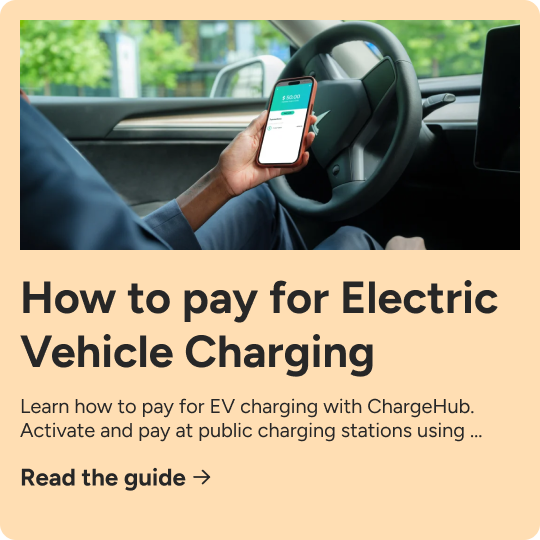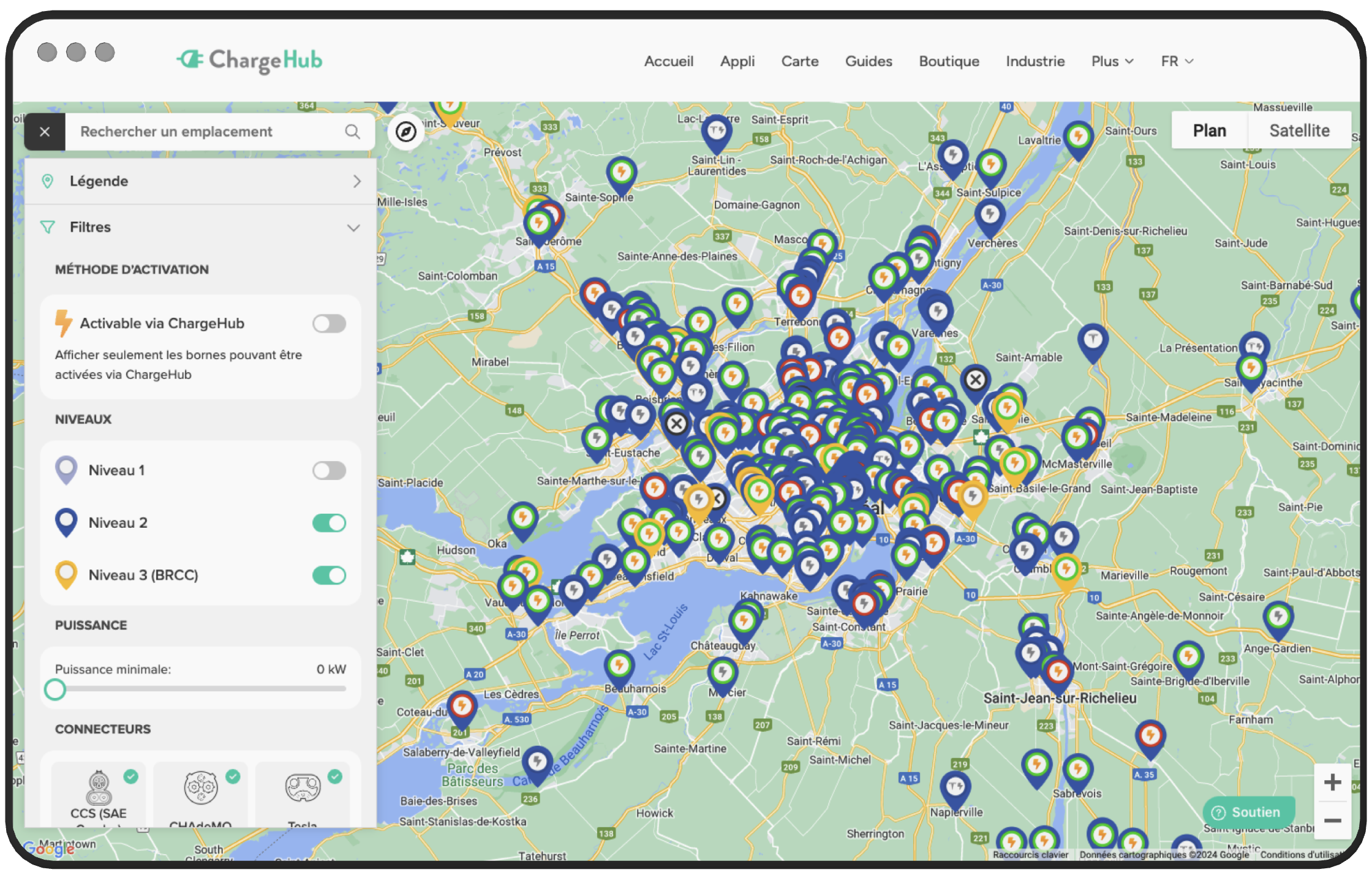-
EV Business Solutions
-
EV Drivers
-
Our Company
-
Resources
Find the Best EV Charging Station for Your Home
Choosing the ideal Level 2 home charging station depends on your specific electric vehicle (EV) model and its power acceptance capacity. Use the tables below to discover which charging station suits your EV’s needs for optimal charging times.
Understanding EV Battery Capacity
Every EV has a battery with a specific capacity, measured in kilowatt-hours (kWh). This capacity reflects how much energy the battery can hold, similar to a fuel tank in a gasoline car. A higher battery capacity translates to a longer driving range, as it stores more energy and allows for greater autonomy.
How Charging Power Affects Charging Time
The power of a home charging station, measured in kilowatts (kW), impacts how quickly your EV can charge. This power is calculated by multiplying the voltage (V) by the amperage (A). In North America, Level 2 home charging stations are typically plugged into 220-240V outlets, making both voltage and amperage key factors in charging speed.
- 15 A: 3.6 kW (3.6kW/240V = 15A)
- 30 A: 7.2 kW (7.2kW/240V = 30A)
- 40 A: 9.6 kW (9.6kW/240V = 40A)
- 48 A: 11.5 kW (11.5kW/240V = 48A)
Higher amperage means higher power capability, and thus faster charging—provided your EV can accept the charging station’s full power output.
For example, if your EV’s power acceptance is 9.6 kW and you use a charging station rated at 11.5 kW, the car will charge at its maximum 9.6 kW rate, not at 11.5 kW. So, it’s essential to match your EV’s power acceptance with the charging station’s capabilities.
The following section shows two tables that show different EV and plug-in hybrid vehicles and their respective maximum power acceptance (kW).
Finding the Right Charging Station for Your Needs
ChargeHub offers a range of home charging stations. To explore more, visit our online store.
The tables below compare charging times for different EV and plug-in hybrid models based on the charging station’s power and the vehicle’s maximum power acceptance.
Sign up for our emails!
See the charging characteristics for 100% electric cars connected to 240 V in the table below:
100% Electric Vehicles
| Electric Vehicles Brands & Models | Electric Car Maximum Power Acceptance (kW) | Electric Vehicle Battery Capacity (kWh) | Charging Station Power of 7.2kW
Charging Time with 30A @ 240V (Hour) |
Charging Station Power of 9.6kW
Charging Time with 40A @ 240V (Hour) |
Charging Station Power of 11.5kW
Charging Time with 48A @ 240V (Hour) |
|---|---|---|---|---|---|
| Audi e-tron | 9.6 | 95 | 13.2 | 9.9 | 9.9 |
| BMW ActiveE | 7 | 32 | 4.5 | 4.5 | 4.5 |
| BMW i3 2014-2016 | 7.4 | 23 | 3.2 | 3.1 | 3 |
| BMW i3 2017 (60Ah battery) | 7.4 | 23 | 3.2 | 3.1 | 3 |
| BMW i3 2017 (90Ah battery) | 7.4 | 32 | 4.4 | 4.3 | 4.5 |
| BMW i3 2018 | 7.2 | 33 | 5 | 5 | 5 |
| BMW i3 (120 Ah) 2019 | 7.2 | 42.2 | 4.25 | 4.25 | 4.25 |
| Cadillac Lyriq | 19.2 | 100.4 | 14 | 10.5 | 8.5 |
| Chevrolet Bolt | 7.2 | 66 | 8.5 | 8.5 | 8.5 |
| Chevrolet Spark | 3.3 | 23 | 7.0 | 7.0 | 7.0 |
| Coda | 6.6 | 31 | 4.5 | 4.5 | 4.5 |
| Fiat 500E | 6.6 | 24 | 3.6 | 3.5 | 3.5 |
| Ford Focus EV | 6.6 | 23 | 3.5 | 3.5 | 3.5 |
| Ford Focus EV 2017 | 6.6 | 33.5 | 5 | 5 | 5 |
| Ford F-150 Lightning | 11.3 | 130 | 18 | 13.5 | 11 |
| Genesis GV60 | 11 | 77.4 | 11.5 | 8 | 6.5 |
| Honda Clarity EV | 6.6 | 25.5 | 4 | 4 | 4 |
| Hyundai Ioniq EV | 6.6 | 28 | 4 | 4 | 4 |
| Hyundai Ioniq 5 | 11 | 77.4 | 11.75 | 8 | 6.5 |
| Hyundai Kona electric | 11 | 67.5 | 10.25 | 9.25 | 7 |
| Kia EV6 | 11 | 77.4 | 11 | 8 | 6.5 |
| Kia Niro | 7.2 | 64 | 9 | 9 | 9 |
| Kia Soul | 6.6 | 27 | 4 | 4 | 4 |
| Kia Soul EV 2020 | 7.2 | 64 | 9 | 9 | 9 |
| Jaguar I-Pace | 7 | 90 | 13 | 13 | 13 |
| Mercedes B Class B250e | 9.6 | 28 | 3.5 | 3 | 3 |
| Mitsubishi i-MiEV | 3.3 | 16 | 5 | 5 | 5 |
| Nissan Leaf 2011-2012 | 3.3 | 24 | 7.5 | 7.5 | 7.5 |
| Nissan Leaf 2013-2016 S | 3.3 | 24 | 7.5 | 7.5 | 7.5 |
| Nissan Leaf S 2013-2015 | 3.3 | 24 | 3.5 | 3.5 | 3.5 |
| Nissan Leaf S 2016 | 6.6 | 24 | 4.5 | 4.5 | 4.5 |
| Nissan Leaf SL&SV 2016 | 6.6 | 30 | 3.5 | 3.5 | 3.5 |
| Nissan Leaf 2017 | 3.3 | 30 | 4.5 | 4.5 | 4.5 |
| Nissan Leaf 2017 | 6 | 30 | 9 | 9 | 9 |
| Nissan Leaf 2018 | 6.6 | 40 | 6 | 6 | 6 |
| Nissan Leaf Plus 2019 | 6.6 | 62 | 8.5 | 8.5 | 8.5 |
| Nissan Leaf 2021 | 6.6 | 40 | 6 | 6 | 6 |
| Polestar 2 | 7.4 | 75 | 10 | 10 | 10 |
| Porsche Taycan | 9.6 | 93.4 | 13 | 9.5 | 9.5 |
| Smart Car | 3.3 | 17.6 | 5.5 | 5.5 | 5.5 |
| Smart Fortwo ED 2017 | 7.2 | 17.6 | 2.5 | 2.5 | 2.5 |
| Smart Fortwo ED Cabriolet 2018 | 7.2 | 17.6 | 2.5 | 2.5 | 2.5 |
| Smart Fortwo ED Coupe 2018 | 7.2 | 17.6 | 2.5 | 2.5 | 2.5 |
| Tesla Model 3 Standard | 7.7 | 50 | 6.9 | 6.5 | 6.5 |
| Tesla Model Long Range | 11.5 | 70 | 9.7 | 7.3 | 6 |
| Tesla Model S 60 Single | 9.6 | 60 | 8.3 | 6.3 | 6.3 |
| Tesla Model S 70 Single | 9.6 | 70 | 9.7 | 7.3 | 7.3 |
| Tesla Model S 75 & 75D | 11.5 | 75 | 10.4 | 7.8 | 6.5 |
| Tesla Model S 85 Single | 9.6 | 85 | 11.8 | 7.8 | 7.8 |
| Tesla Model S 90 Single | 9.6 | 90 | 12.5 | 9.4 | 9.4 |
| Tesla Model S 60 Dual | 19.2 | 60 | 8.3 | 6.3 | 5.2 |
| Tesla Model S 70 Dual | 19.2 | 70 | 9.7 | 7.3 | 6 |
| Tesla Model S 85 Dual | 19.2 | 85 | 11.8 | 8.9 | 7.4 |
| Tesla Model S 90 Dual | 19.2 | 90 | 12.5 | 9.4 | 7.8 |
| Tesla Model S 100D & P100D | 17.2 | 100 | 13.9 | 10.4 | 8.7 |
| Tesla Model X 60 Single | 11.5 | 60 | 8.3 | 6.3 | 5.2 |
| Tesla Model X 75 Single | 11.5 | 75 | 10.4 | 7.8 | 6.5 |
| Tesla Model X 90 Single | 11.5 | 90 | 12.5 | 9.4 | 7.8 |
| Tesla Model X 60 Dual | 17.2 | 60 | 8.3 | 6.3 | 5.2 |
| Tesla Model X 75 Dual | 17.2 | 75 | 10.4 | 7.8 | 6.5 |
| Tesla Model X 90 Dual | 17.2 | 90 | 12.5 | 9.4 | 7.8 |
| Tesla Model X 100D & P100D | 17.2 | 100 | 13.9 | 10.4 | 8.7 |
| Tesla Model Roadster | 17.2 | 56 | 7.8 | 5.8 | 4.9 |
| Toyota Rav4 | 9.6 | 41.8 | 5.5 | 4.5 | 4.5 |
| VW e-Golf | 7.2 | 24 | 3.5 | 3.5 | 3.5 |
| Volkswagen ID.4 | 11 | 82 | 11.4 | 8.5 | 7.5 |
| VW e-Golf 2017/2018 | 7.2 | 35.8 | 5 | 5 | 5 |
| Polestar 2 2021 | 7.4 | 75 | 10 | 10 | 10 |
See the charging characteristics for plug-in hybrid vehicles connected to 240 V in the table below:
Plug-in Hybrids
|
Brands |
Hybrid Vehicle Models |
Maximum Power Acceptance (kW) |
Battery Capacity (kWh) |
Charging Station Power of 7.2kW Charging Time with 30A @ 240V (Hour) |
Charging Station Power of 9.6kW Charging Time with 40A @ 240V (Hour) |
Charging Station Power of 11.5 kW Charging Time with 48A @ 240V (Hour) |
|---|---|---|---|---|---|---|
|
Audi |
A3 E-Tron |
3.3 |
8.8 |
2.5 |
2.5 |
2.5 |
|
Q5 Plug-in Hybrid |
7.7 |
14.1 |
2 |
2 |
2 |
|
|
BMW |
225xe Active Tourer |
10,0 kWh |
3h15min |
3h15min |
3h15min |
|
|
330e |
3.6 |
7.6 |
2 |
2 |
2 |
|
|
330e |
3.6 |
12 |
3.5 |
3.5 |
3.5 |
|
|
530e |
3.6 |
9.2 |
2.5 |
2.5 |
2.5 |
|
|
740e |
3.6 |
9.2 |
2.5 |
2.5 |
2.5 |
|
|
540e hybride rechargeable |
12,0 kWh |
4h |
4h |
4h |
||
|
i8 |
3.6 |
7.1 |
2 |
2 |
2 |
|
|
i8 Coupe et i8 Roadster 2019-2020 |
11,7 kWh |
2h |
1h47min |
1h47min |
||
|
X5 xDrive-40e |
3.6 |
9 |
2.5 |
2.5 |
2.5 |
|
|
X5 xDrive45e |
3.6 |
24 |
6.5 |
6.5 |
6.5 |
|
|
Cadillac |
CT6 |
3.6 |
18.4 |
4.5 |
4.5 |
4.5 |
|
ELR |
3.3 |
16.5 |
4 |
4 |
4 |
|
|
Chevrolet |
Volt |
3.3 |
16.5 |
4 |
4 |
4 |
|
Volt 2016-2018 |
3.6 |
18.4 |
4.5 |
4.5 |
4.5 |
|
|
Volt LT 2019 |
3.6 |
18.4 |
4.5 |
4.5 |
4.5 |
|
|
Volt Premier 2019-2020 |
7.2 |
18.4 |
2.5 |
2.5 |
2.5 |
|
|
Chrysler |
Pacifica |
6.6 |
16 |
2.5 |
2.5 |
2.5 |
|
Fisker |
Karma |
3.3 |
16 |
4 |
4 |
4 |
|
Ford |
C Max Energi |
3.3 |
7.6 |
2 |
2 |
2 |
|
Ford Escape |
3.3 |
14.4 |
4.5 |
4.5 |
4.5 |
|
|
Fusion Energi |
3.3 |
7.6 |
2 |
2 |
2 |
|
|
Fusion Energi 2019-2020 |
9 kWh |
2h30min |
2h30min |
2h30min |
||
|
Honda |
Accord |
6.6 |
6.7 |
1 |
1 |
1 |
|
Clarity plug-in |
6.6 |
17 |
2.5 |
2.5 |
2.5 |
|
|
Hyundai |
Ioniq Plug-in |
3.3 |
8.9 |
2.5 |
2.5 |
2.5 |
|
Ioniq hybride rechargeable 2020 |
9,8 kWh |
2h |
2h |
2h |
||
|
Sonata |
3.3 |
9.8 |
3 |
3 |
3 |
|
|
Sonata hybride rechargeable 2020 |
10 kWh |
2h30min |
2h30min |
2h30min |
||
|
Karma |
Revero |
6.6 |
21.4 |
3 |
3 |
3 |
|
Revero |
28 kWh |
6h15min |
6h15min |
6h15min |
||
|
Kia |
Niro |
3.3 |
8.9 |
2.5 |
2.5 |
2.5 |
|
Optima |
3.3 |
9.8 |
3 |
3 |
3 |
|
|
Mercedes |
C350 Hybrid |
3.3 |
6.2 |
2 |
2 |
2 |
|
GLC 350e |
3.6 |
8.7 |
2.5 |
2.5 |
2.5 |
|
|
GLE 550e |
3.3 |
8.8 |
2.5 |
2.5 |
2.5 |
|
|
S550 Hybrid |
3.3 |
8.7 |
2.5 |
2.5 |
2.5 |
|
|
B hybrid plug-in |
15,6 kW |
7h |
7h |
7h |
||
|
MINI Cooper |
SE Countryman ALL4 |
3.3 |
7.6 |
2.5 |
2.5 |
2.5 |
|
SE Countryman ALL4 |
10,0 kWh |
3 |
3 |
3 |
||
|
Mitsubishi |
Outlander |
3.3 |
12 |
3.5 |
3.5 |
3.5 |
|
Porsche |
Cayenne S E-Hybrid |
3.6 |
10.8 |
3 |
3 |
3 |
|
Cayenne S E-Hybrid (Upgrade) |
7.2 |
10.8 |
1.5 |
1.5 |
1.5 |
|
|
Panamera S E-Hybrid |
3.6 |
9.4 |
2.5 |
2.5 |
2.5 |
|
|
Panamera S E-Hybrid (Upgrade) |
7.2 |
9.4 |
1.25 |
1.25 |
1.25 |
|
|
Panamera 4 E-Hybrid |
3.6 |
14.1 |
4 |
4 |
4 |
|
|
Panamera 4 E-Hybrid (Upgrade) |
7.2 |
14.1 |
2 |
2 |
2 |
|
|
918 Spyder |
3.6 |
6.8 |
2 |
2 |
2 |
|
|
Toyota |
Prius EV |
3.3 |
4.4 |
1.5 |
1.5 |
1.5 |
|
Prius Prime EV |
3.3 |
8.8 |
2.5 |
2.5 |
2.5 |
|
|
Prius Prime EV 2020 |
3.3 |
8.8 kWh |
2 |
2 |
2 |
|
|
VIA |
Motors Truck / VIA Motors Van |
17.3 |
23 |
3 |
2.5 |
2 |
|
Volvo |
V60 |
3.3 |
11.2 |
3.5 |
3.5 |
3.5 |
|
XC90 T8 |
3.3 |
9.2 |
3 |
3 |
3 |
|
|
XC90 T8 |
11,6 kWh |
2h30min |
2h30min |
2h30min |








.jpg?width=838&height=560&name=Charger-Comparison%20(1).jpg)



